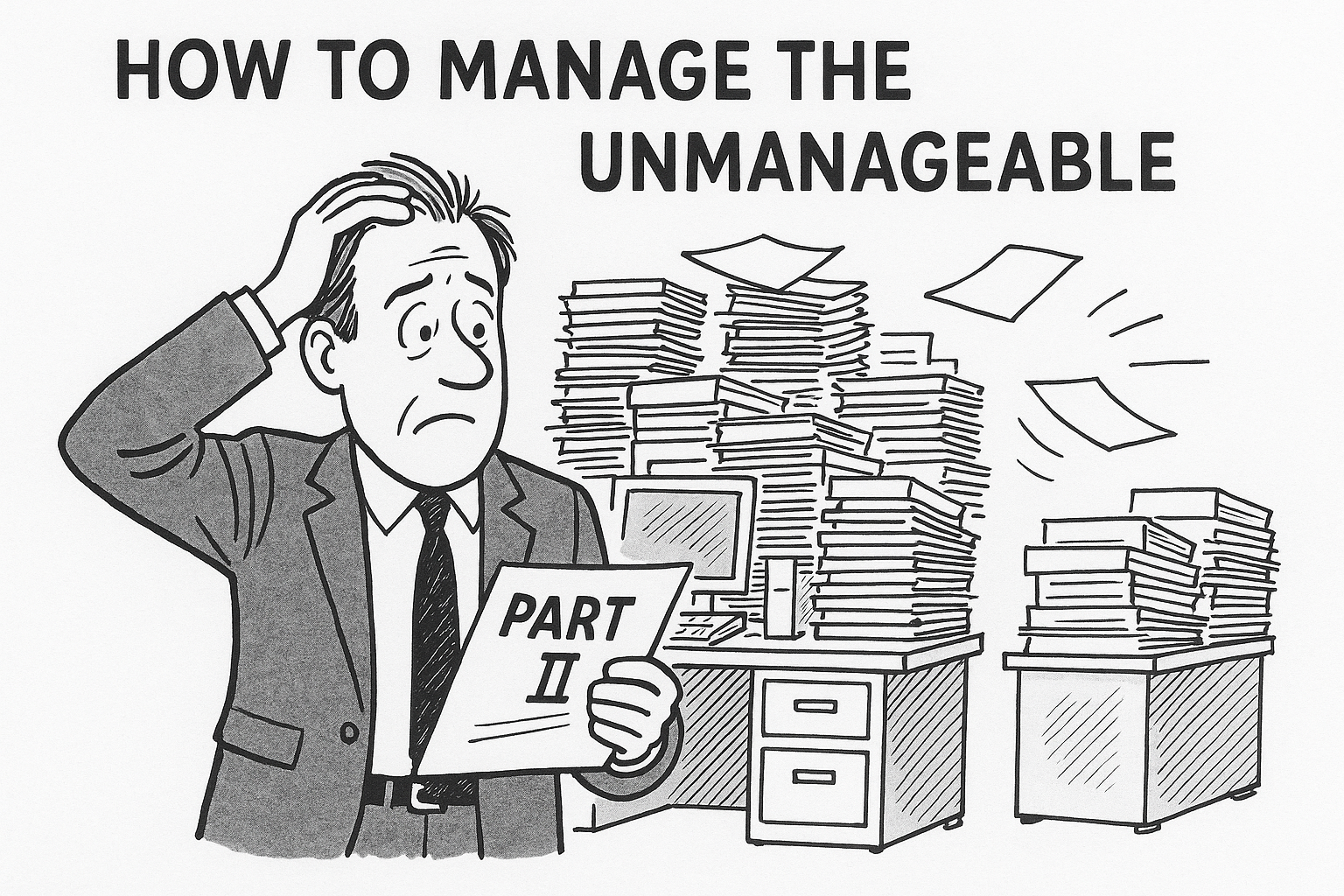I believed I was done after the first 10 truisms. But after earning “Best Article” award for 1985, my people dared me to come up with another 10. Coming up with more unique truisms that I have learned about managing the unmanageable was harder than I thought, but I had nearly 2 years to ponder. This earned me another “Best Article” award in 1987. This was the pinnacle of my Air Force career. No where to go but down!
Without further ado. Part II.
How to Manage the Unmanageable – Part II
By Col Donald Scooler
If Rocky can do it so can I! In the July 1985 issue of The Air Force Comptroller magazine, I was fortunate to see my article, How to Manage the Unmanageable, in print. I had a lot of fun writing it, and frankly even more fun reaping the benefits of several kind comments and even a plaque from General Spangrud. With that kind of inspiration, how could I possibly avoid the temptation of writing a sequel. As you may recall, the article consisted of ten short statements I referred to as “truisms,” thoughts which helped me over the years to meet the daily challenges of managing people and pleasing bosses. One famous comedian often said: I got a million of ’em. Well don’t fear, I haven’t got a million “truisms,” but I do believe I can share ten more with you which again I have found helpful in meeting management challenges and keeping a sense of humor. So here goes How to Manage the Unmanageable II or HTMTU Il for those who like acronyms.
* Bad News Doesn’t Improve with Age.
Of course, like all truisms, this one is not always true. Sometimes events change or improve with no action on our part, but most often bad situations worsen if no remedial action is taken. Your boss would much prefer to hear bad news from you than from his boss. Believe it or not he may even have an idea or two how to fix it. Fix what is within your authority to fix but inform others (superiors and peers) of situations they can help with or those which they may hear about anyway. Keep the boss informed
* Eat an Elephant One Piece at a Time.
Difficult problems are not solved with quick, simple solutions. Problem solving is almost always an iterative process. When the boss hands you a project which is apparently overwhelming, do not despair. He really doesn’t expect a quick solution (even if he says so). He does, however, want to see some progress made toward a goal. Divide the problem into many smaller doable goals and report your progress back. (By the way, you should brag a little about whatever progress you make.) What not to do is take the problem back to your office and try to come to the perfect solution before reporting back. The boss’s only logical conclusion is that you’ve done nothing. One example comes to mind. The task: Develop a management information system for a major command commander that will allow him to readily assess the health of his command and its bases. We’ve been working on that one for 2 years now and each month we get a little better, but we still have a long way to go. However, by nibbling away at this elephant we have a far better system than we had 2 years ago.
* The Boss May Not Always Be Right But He’s Still the Boss.
Just a few words here about loyalty. No one believes you’ll always agree with your boss; but you do owe him the loyalty to try to make his decisions work, not to prove him wrong. One of the surest ways to make yourself look good is to make your boss look good. You’ll also probably realize that there are several ways to accomplish a goal, and his way will work (with your help) as well as the way you had in mind.
* Don’t Suffer in Silence.
As I travel to visit our comptroller offices, I allow time for our people to talk to me about problems they are working. All too often they will tell me of a problem they’ve been struggling with for months but have not elevated to me or my staff until I specifically question them about it. Many times, by elevating a question you may find an answer or at least get some empathy. Many times, you’ll find that you are not the only one struggling with the problem, and perhaps some others have found a way to solve it or lessen it. In a word—communicate.
* There’s No Such Thing as Bad Visibility.
Again, a truism which is not always true. Of course, negligence, incompetence, or a lack of integrity can gain you some bad visibility. The main point here is that actors succeed better than reactors. The cliche “never volunteer” is as obsolete as the World War I stereotype of a draftee from which it was spawned. The comptroller people who volunteer for the tough jobs (the elephants if you will) and make some progress in accomplishing them will be the future top comptrollers in the Air Force. The middle managers and leaders who can think on their feet and who become known throughout their profession as doers and experts will be the future top managers in comptrollership. Be one of t h e actors.
* Anticipate the Next Shoe.
If the boss reads a message involving a problem in your area and asks, “What does this mean?”, he really wants to know more than that. Most probably he wants to also know what you are doing to solve it and when you think it will be solved. Answer all three parts of the understated question, and you’re anticipating the drop of the next shoe. Did you ever call an individual and ask “Is Col – _ in please?” The receptionist answers “No”‘ or even “No, sir.” You weren’t really calling to take an attendance check. You obviously want to speak to the individual you are calling. Therefore, it would be far more professional for the receptionist u say: “No, but he’ll be in tomorrow, or five minutes from now, or even next week’ and also to ask if he can return your call. This is also anticipating the next shoe.
* Put the Em-pha’-sis on the Right Syl-la’-ble.
Most of us work for a commander. Our primary emphasis and interest should be on what the commander’s emphasis is. Worry about commander things first and comptroller things second. That may sound a little heretical, but I guarantee not following that principle is the way many comptrollers lose the confidence and interest of their commanders. The professional comptroller that devotes most of his financial management skills to solving the commander’s operational problems will continuously garner the respect of his commander and retain the honor of being one of the key staff members. It is sometimes too easy to accomplish comptrollership for comptrollers rather than commanders. Don’t fall into that trap or you’ll have only comptrollers listening to you.
* Murphy Lives.
Don’t curse Murphy’s Law. Accept its existence, challenge it, and stay a step ahead of it. If you allow important events to have any probability to go awry they will. Check, double check, and check one last time to ensure important milestones are met. If it is critical that a certain program be run by your data automators to get a critical report out or meet a payroll, don’t assume it will be run. Make sure your data processing folks have what they need and meet their timetables. If a distinguished visitor is coming to your base don’t assume the room will be ready for him on arrival. Check it yourself or have it checked prior to his arrival. I bet that rings a few bells for you! Stay a step ahead of your boss and Murphy, and you’re a sure-fire success.
* TANSTAFL.
A misprint? An eye test? No, neither. It’s an acronym ready made for financial managers. There ain’t no such thing as a free lunch. Our business consists of constant trade-offs, difficult choices, and prioritization. In working a commander’s problem, we must constantly remind him that each decision entails a cost (not always obvious) and we must not fool ourselves that we can really accomplish more with less. At the very top level in DOD our leaders have some tough choices ahead. Programs started in the real growth funding years (1981-1985) are still in a growth period, but the funding has been constrained to zero or negative growth for the present and foreseeable future. Something’s going to have to give. I hope we don’t fall into the 70s’ trap of creating hollow forces. Only time will tell. Our job as financial managers, however, is to continue to ensure commanders understand the cost and impacts of potential decisions. A final thought involves the most important function of management-communication. The root of all success and failure in financial management is the ability or inability to communicate well. Notice the emphasis on the “well” because the final truism is-
* You Cannot NOT Communicate.
Just the way you enter a room communicates. Silence communicates. Your boss and your subordinates pick up all kinds of verbal, written, and nonverbal communication from you every hour of every day. Understand this-control your communications, insist on feedback, and encourage communication lines to remain open-and you’re well on your way to a successful career as a leader in comptrollership.
Col Scooler is Deputy Chief of Staff, Comptroller. at Headquarters Military Airlift Command, Scott AFB, IL. He was commissioned in the U.S. Air Force in 1961 through AFROTC. He earned a Master of Business Administration degree from the Ohio State University (AFIT). He is a graduate of SOS, ACSC. ICAF, AWC, Army War College in residence, and PMCS. Prior to his present position, Col Scooler, was MAC’s Director of Accounting and Finance. Col Scooler is a member of the ASMC.


